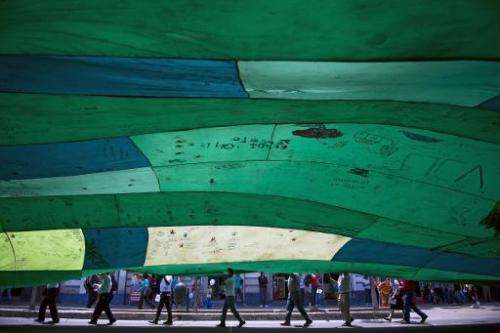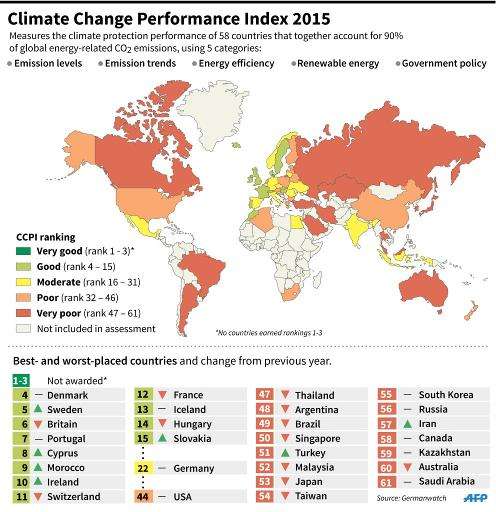Time presses as climate talks head for penultimate day

Environment ministers from around the world face mounting time pressure on Thursday to shape a blueprint for a global pact on climate change with ground-breaking carbon curbs at its core.
There are concerns over an unwieldy draft text, intended to guide negotiations that by December 2015 must forge the most ambitious environmental accord in history.
There was also a revival of a years-old dispute over which countries should do more to tackle carbon emissions driving dangerous climate change.
"It is clear that progress over the last 10 days or so has been too slow, The text has grown instead of being streamlined," said European Climate Commissioner Miguel Arias Canete.
He told a roundtable late Wednesday that compromise "will take courage and it will mean countries moving to the edge of their comfort zones."
"We need to act with more dispatch," added US climate envoy Todd Stern.
The talks—the annual forum of the UN Framework Convention on Climate Change (UNFCCC)—are scheduled to end late Friday after a 12-day huddle in Lima.
Their goal is to clear the way to a deal in Paris to slow the juggernaut of climate change by limiting global warming to two degrees Celsius (3.6 degrees Fahrenheit) over pre-industrial levels.
At its heart would be a roster of voluntary national pledges on Earth-warming greenhouse-gas emissions spewed by burning coal, oil and gas.
But countries remained far apart on its design.

This casts a shadow over prospects for next year, when pledges are put on the table ahead of the Paris showdown.
Sparring revived over "differentiation"—how to apportion responsibility between rich and developing nations for ramping up action on carbon.
India led a chorus of developing countries on Wednesday to defend a division of responsibilities enshrined in the UNFCCC at its birth 22 years ago.
"The new agreement has to be in full accordance with all, I repeat all, the principles and provisions of the Framework Convention," warned Environment Minister Prakash Javadekar.
Rich and poor
The "differentiation" squabble is rooted in what happened in 1992, when UN members were split into advanced economies, the first to burn fossil fuels to power their prosperity, and developing countries, which—until then—bore little blame for carbon pollution.
Europe, the United States and other advanced economies accept that differentiated responsibilities remain valid today.
But they argue it is senseless to shape a post-2020 deal on the basis of the world as it was in 1992.
Voracious burners of coal, developing countries now account for nearly 60 percent of global emissions, a share set to rise, they argue.
"Some are acting as if (differentiation), this basic principle of the Convention, were threatened with extinction but this is in fact completely untrue," said Stern.
But "a permanent division of countries into the two categories established in 1992... makes no sense in a world with rapidly changing material conditions."
Europe's Canete agreed, saying the UNFCCC's principles "need to be applied dynamically in a way that mirrors evolving reality."
On Wednesday, thousands of activists and campaigners for indigenous rights marched in central Lima in a bid to hike pressure on negotiators.
With the 2015 deadline looming, climate change has returned to the top political table after years in the wilderness following a near-fiasco at the 2009 conference in Copenhagen.
To get a good chance of reaching the two degree target, annual emissions must fall by 40 to 70 percent by 2050, and to zero or below by 2100, say scientists.
Right now, Earth is on track for warming this century of about four degrees Celsius, cursing future generations with species loss, rising seas, drought, flood and disease spread, they warn.
© 2014 AFP





















